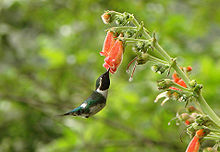| Silvistella di Esmeraldas | |
|---|---|
 | |
| Stato di conservazione | |
In pericolo[1] | |
| Classificazione scientifica | |
| Dominio | Eukarya |
| Regno | Animalia |
| Sottoregno | Eumetazoa |
| Superphylum | Deuterostomia |
| Phylum | Chordata |
| Subphylum | Vertebrata |
| Infraphylum | Gnathostomata |
| Superclasse | Tetrapoda |
| Classe | Aves |
| Sottoclasse | Neornithes |
| Superordine | Neognathae |
| Ordine | Apodiformes |
| Famiglia | Trochilidae |
| Sottofamiglia | Trochilinae |
| Genere | Chaetocercus |
| Specie | C. berlepschi |
| Nomenclatura binomiale | |
| Chaetocercus berlepschi Simon, 1889 | |
| Areale | |
 | |
La silvistella di Esmeraldas (Chaetocercus berlepschi Simon, 1889) è un uccello della famiglia Trochilidae, endemico dell'Ecuador.[1][2]
L'epiteto specifico è un omaggio all'ornitologo tedesco Hans von Berlepsch (1850 – 1915).
Descrizione
[modifica | modifica wikitesto]Questo piccolo colibrì raggiunge lunghezze di 6-7 cm.[1]
Distribuzione e habitat
[modifica | modifica wikitesto]L'areale di Chaetocercus berlepschi è ristretto ad una piccola parte dell'Ecuador occidentale (province di Esmeraldas, Manabí, Santa Elena e Guayas).[1]
Conservazione
[modifica | modifica wikitesto]La IUCN Red List classifica Chaetocercus berlepschi come specie in pericolo di estinzione (Endangered).[1]
Note
[modifica | modifica wikitesto]- ^ a b c d e (EN) BirdLife International, 2013, Chaetocercus berlepschi, su IUCN Red List of Threatened Species, Versione 2020.2, IUCN, 2020. URL consultato il 30 aprile 2019.
- ^ (EN) F. Gill e D. Donsker (a cura di), Family Trochilidae, in IOC World Bird Names (ver 9.2), International Ornithologists’ Union, 2019. URL consultato il 7 dicembre 2016.
Altri progetti
[modifica | modifica wikitesto] Wikimedia Commons contiene immagini o altri file su Chaetocercus berlepschi
Wikimedia Commons contiene immagini o altri file su Chaetocercus berlepschi Wikispecies contiene informazioni su Chaetocercus berlepschi
Wikispecies contiene informazioni su Chaetocercus berlepschi
Collegamenti esterni
[modifica | modifica wikitesto]- Chaetocercus berlepschi, in Avibase - il database degli uccelli nel mondo, Bird Studies Canada.










